#russian campaign
Text
Ida meets Ney in Russia
I dimly remember that somebody (Cadmus?) mentioned they wanted to read more from Ida. So here’s a brief snippet of Ida – for once – getting in trouble with her hero, of Ney scolding her and … being jealous of Eugène?
The meeting takes place somewhen in late 1812 or early 1813, as much as it’s possible to tell from Ida’s chronological rollercoaster ride. In any case, after or at the end of the Russian retreat. Because of course Ida had joined the Russian campaign as well.
And not only she. If any tumblerinas here plan on learning how to time travel and want to go back to see the Grande Armée march towards Moscow, they don’t need to worry about incognitos. Most likely they would barely be noticed, as apparently there were wagonloads of groupies following their heroes around.
Okay: four. But that’s only those ladies Ida travelled with. Plus, two of them died on the way back.
Ida was particularly fond of a Polish-Lithuanian girl named Nidia, as madly in love with general Montbrun as Ida was in love with Ney. Not that either of the two got to see their idol much during the march. As a matter of fact, the first thing Nidia learned before entering Moscow was that Montbrun had been killed at the battle of Borodino. Other than that, Ida claims to have had a bad feeling about this city from the start:
As we entered Moscow, occupied at last by our troops, this immense city seemed to us like a vast tomb; its empty streets, deserted buildings and solemnity of destruction were heartbreaking. Despite the pomp of victory, I felt struck by I don't know what new kind of melancholy when I saw it; the flags seemed to me gloomy and almost surrounded by funeral crêpes and black forebodings. We were staying in Rue Saint-Pétersbourg, near the Miomonoff palace, which was soon occupied by Prince Eugène. The sight of this young hero and the cheers of the soldiers, who adored him, gave us back all the illusions of victory.
Okay, so I just added this because it’s so rare to see Eugène receive some praise. (I should also mention that the adored young hero was growing bald at an alarming rate and that his bad teeth were killing him.)
As a matter of fact, Ida claims that Nidia was especially interested in Eugène because he was rumoured to maybe become king of Poland (yes, another candidate). These rumours did really exist, Eugène mentions them in a letter to his wife before the campaign started. (And he also makes it pretty clear that these are just rumours and that he has not the slightest ambition to stay in this country. He may have used different vocabulary than Lannes but he didn’t like the region any better.)
The following night, Ida and Nidia wake up to a burning Moscow and are saved by soldiers of 4th corps. On the retreat, they seem to have followed headquarters as closely as possible, which was their safest bet to stay alive (because where the emperor is, there’s food and firewood and a resemblance of order) but still witness horrible tragedies. After the crossing of the Berezina, they apparently followed the remnants of Eugène’s 4th corps to Marienwerder, before Nidia says goodbye and goes back to defending Poland.
But before, on the way, at Valutina (?), Ida finally sees Ney again
At this point, after the retreat, Ida at least starts to question her decision to follow the Grande Armée around. Or something like that.
I have just recounted my fatigue, my difficulties and my perils in a war beyond human endurance, because of the new aspects it seemed to give to destruction and death. A powerful feeling made me undertake everything and endure everything. Why was I going to face the hazards of a campaign? Why was I going to expose the weakness of a woman to the rigours of a climate of iron? In order to obtain yet another glance from the one whose smile had always paid me for my military errands. This look was always like a world offered to my hopes; the dream alone of this reward had made possible all the impossibilities of time, distance, sex and fortune. My life was thus burnt for a few hours, still uncertain. I was giving up everything for a moment in space. Alas! this time, how I was going to regret this moment that had cost me so much to conquer! I had just gambled my existence for a flash of happiness, and this flash, the quickest of my life, became the cruelest.
I had to spend three fatal hours in a miserable shack on the outskirts of Volutina. My dress was so horrible that it was a real disguise. In a person dressed like that, one could hardly suspect a woman. Ney, however, only had to look my way to recognise me. To have been seen was enough to have been discovered. I was about to rush to the front of this first happiness; I was about to testify to the soul of my life how proud I was of this divination of friendship, of this perspicacity of memory, when words of an energy which was far from that of the feeling of which I was possessed, intimated to me the order of the most positive dismissal:
"What are you doing here? What do you want? Go away quickly."
With this address and a few short, curt rebukes about my reckless rage and my fury at following him everywhere, I only had the strength to reply: "It is a rage, indeed, but it is not at least the rage of pleasure or vanity," pointing to my coarse clothes and my face burnt by the sun and faded by fatigue. He took no notice of either the harangue or the costume. He was off and running. His displeasure at seeing me there was so great; he let it out so vividly that I thought he was going to push me back to the opposite bank of the Dniéper in his anger. Stunned by the reception, struck by lightning, I remained motionless for more than an hour, staring at him, thinking I saw him; he had disappeared without paying any more attention to me or worrying about me.
From which we can deduct that Ney was not a reader of Jane Austen novels. Otherwise he would have known that whenever you have behaved in a way that made a woman fall in love with you that’s f-ing your fault, monsieur!
In 1813, when I recalled to Marshal Ney this scene of such violent fury, followed by such cruel silence and abandonment, he told me that he had been so mortally frightened by the extravagance which had pushed me into the midst of so many perils and the licentiousness of an army, that he had even been tempted to beat me. Truth requires me to admit that the temptation had been so strong that he had, I believe, yielded to it a little; it was without his knowing it, for the great passions know neither all they want nor all they do. Anger is therefore still love, since it is as blind as fury.
Girl, get help. Seriously.
When we crossed the Dniéper at Serokodia, I could have had another word with him. A new laurel had just hidden his wrongs and healed my wound. I could have, I wanted to say to him: You have just added to your immortal glory here; you alone have just saved Frenchmen lost in deserts of ice; I would have liked to express to him what all parties repeat today, what posterity will proclaim on the ashes of the brave... But I stuck to the joy of hearing the distant cheers. There was then a little fear in my delirium for him, and I almost have the idea that I idolised him even more by fearing him in that way…
Did I mention the thing about getting help?
Yes, even the reproach was appreciated by my heart, and still seemed to me a tender interest. I found I don't know what pleasure in hearing myself scolded later for my association with Nidia, my marches and counter-marches with the Viceroy's troops. No matter how many times I told the Marshal that Eugène's protection had been focused exclusively on the young Lithuanian girl, and that I had slipped unnoticed into this benevolence, he took it into his head to believe nothing of these sincere protestations. To make him reconsider such a strongly conceived idea would have meant exposing myself to a repeat of the Dniéper order and military correction. I had no intention of trying the same pleasure twice. Finally, he saw the evidence of my attachment, and he found the generosity to prove this belated but strong conviction to me [...]
By calling her his brother-in-arms, by the way. And this, I believe, really meant a lot to Ida.
#napoleon's marshals#michel ney#ida saint-elme#memoirs#napoleon's family#eugene de beauharnais#russian retreat#russian campaign#russia 1812#also#we have a phone call by a certain vice-queen interested in the exact definition of the word “protection” in this particular context
43 notes
·
View notes
Text

“I’ve heard enough from you Claude. We are turning this campaign around and going home!”
#napoleon bonaparte#napoleon#bonaparte#Claude#Claude is back#Russian campaign#Napoleon looks pissy#napoleon did that#napoleon did a thing#that time
30 notes
·
View notes
Text
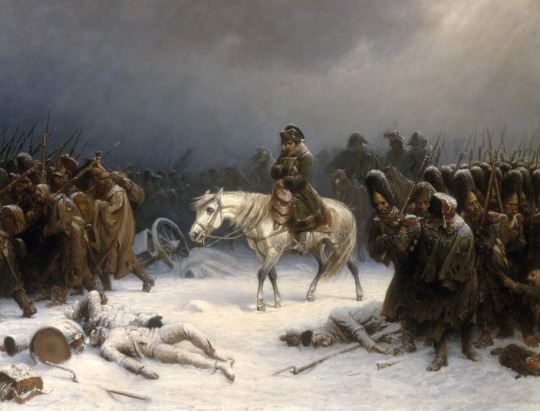
Napoleon's retreat from Moscow by Adolph Northen
#napoléon bonaparte#napoleon#bonaparte#art#adolph northen#retreat#moscow#russia#russian campaign#napoleonic#france#first french empire#french#napoleonic wars#europe#european#history#winter#snow#la grande armée
271 notes
·
View notes
Note
https://www.tumblr.com/askcheerbear/190441365536/marshal-neys-dangerously-isolated-iii-corps
Were you aware of this?
Of course. It was one of the Emperor’s projects in order to boost morale - each corps should have at least two cuddly and fluffy creatures for the sake of stress relief (or in case of starvation).
Or, some had Murat, who, in fact, fits the description pretty well. Luckily it wasn’t our case.
5 notes
·
View notes
Text

From Napoleon by Frank McLynn. Horrors of the retreat from Russia. (Sorry for the crooked picture. There's a sleepy baby on me.)
11 notes
·
View notes
Text
Russian POW finally returns to France
A memoir by a French officer taken prisoner near the Berezina in 1812 who was able to get back in 1815 after many adventures and hardships. He had a sense of humor despite everything he went through.
Parvenus à la frontière, la douane nous arrêta. Comme nous n'étions plus qu'à quelques pas de la France, je bondis hors de la voiture et je courus, avec une joie d'écolier en rupture de ban, fouler le sol de la Patrie. Quel moment délicieux ce fut pour moi ! Il m'est impossible d'exprimer ce que je ressentais ; c'était du délire. Après une absence de près de trois années, après tant de jours passés à espérer et à désespérer, je retrouvais donc mon pays bien-aimé. D'un seul coup, toutes mes souffrances, toutes mes tristesses étaient oubliées. Je me croyais un nouvel homme ; je recommençais à vivre ; je me sentais le cæur plus léger, comme débarrassé d'un énorme fardeau. Je me redressais avec la fierté d'un homme libre, moi qui, depuis si longtemps, avais dû courber l'échine devant le vainqueur. L'inspection des douaniers fut d'assez longue durée ; mais que m'importait alors ? Je respirais à pleins poumons l'air du bon pays de France. Cet air me grisait ; j'avais envie de rire et de pleurer à la fois. Mon rêve était devenu une réalité, que nul ne pouvait m'arracher.
----
When we got to the border, the customs stopped us. As we were only a few steps away from France, I jumped out of the carriage and ran with the joy of a schoolboy to set foot on the soil of my country. What a delightful moment it was for me! It is impossible for me to express what I felt; it was delirium. After an absence of almost three years, after so many days spent in hope and despair, I retrieved my beloved country. Suddenly, all my sufferings, all my sorrows were forgotten. I thought I was a new man; I was beginning to live again; I felt lighter at heart, as if relieved of an enormous burden. I straightened up with the pride of a free man--I, who for so long had had to bow my back before the victor. The customs officers' inspection lasted quite a long time; but what did I care then? I breathed deeply the air of the good country of France. This air intoxicated me; I wanted to laugh and cry at the same time. My dream had become a reality, which no one could take away from me.
Memoires d'un grenadier de la grande armée (19 avril 1808-10 octobre 1815) by Honoré Beulay
hathitrust
16 notes
·
View notes
Text
Part 4: Typhus and the Russian Campaign
More from the chapter about the role typhus played in Napoleon’s Russian campaign in my Disease & History book. As written in a previous post, typhus was endemic in Europe at the time, but weather also played tricks on Napoleon. Things now started to go awry:
The abnormally hot, dry weather had affected the wells, water was scarce and polluted by organic matter. The enemy now menaced the front lines, so the supply trains had to move back to the rear of the fighting regiments. Poland’s rudimentary roads were either soft with loose dust or rutted and hardened after the spring rains and hot sun, causing the wagons to lag behind and food to be scarce in the leading columns. The huge army - much too large for coherent command - lacked efficient discipline. Only the best units were accustomed to long, ordered marches and moved in a compact military formation but the greater part of the army dissolved into straggling undisciplined bands. Despite stringent orders and harsh punishments, this multitude of stragglers was forced by hunger to pillage the cottages, livestock and fields of the Polish peasants, their nominal allies.The Poles can hardly be blamed if they did not greet the French as their liberators from the Russian tyrant. The supplies, the auxiliary troops, the guerrilla fighters upon which Napoleon had counted, failed to materialize. Instead the eternal pillaging by his half-starved armies aroused a sullen fury which was to recoil upon his soldiers during the retreat.
If the war of liberation [of Poland] had already been lost, so had the chance of an easy victory over Russia. Nearly twenty thousand horses, twice the number that might be expected to fall in a single major battle, died from the lack of water and forage on the road to Vilna. Men also suffered. Hunger and polluted water produced the common campaign diseases of dysentery and enteric fevers. New hospitals were hastily established at Danzig, Konigsberg and Thorn but they were unable to cope with the mob of returning sick. Then, just after the successful crossing of the Niemen, a few cases of a new and disastrous malady occurred. Men developed a high temperature and a blotchy pink rash and their faces assumed a bluish tinge. Many died quickly. Typhus fever now held the army in its unrelenting grip.
In a previous post, the passage I copied from Disease & History included “it was only in conditions of warfare, famine and extreme poverty that major outbreaks occurred”. Two of these conditions have now been met for the Grande Armee,
The hot weather in the early part of the campaign caused more than lack of water; some men actually died of heat stroke. It was especially bad for the cuirassiers, who must have cooked in their metal shell. Water was so scarce that at least one memoirist resorted to drinking horse urine. Needless to say, water would have been saved for drinking, not for bathing or for washing clothing. Lice multiplied.
I’m a bit surprised that Napoleon did not foresee the problems associated with the state of Poland’s roads. After all, he had fought in Poland before.
As for the horses, so many died during the Russian campaign that one major problem with the reconstituted army of 1813 was the lack of replacements for them.
Disease & History, second edition, by Frederick E. Cartwright and Michael Biddiss, Sutton Publishing, 2000; pp. 90-91
26 notes
·
View notes
Photo
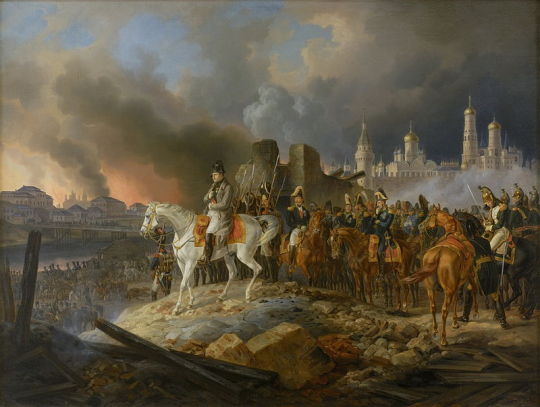
Napoleon in burning Moscow - Adam Albrecht
During the French occupation of Moscow the 1812 Fire of Moscow persisted from 14 to 18 September 1812 and all but destroyed the city. The Russian troops and most of the remaining residents had abandoned Moscow on 14 September 1812 just ahead of French Emperor Napoleon's troops entering the city after the Battle of Borodino. The Moscow military governor, Count Fyodor Rostopchin, has often been blamed for organising the destruction of the sacred former capital to weaken the French army in the scorched city even more.
#Fire of Moscow#Battle of Borodino#Count Fyodor Rostopchin#Napoleon#XIX century#russian campaign#french history#russian history#Adam Albrecht#paintings#art#arte
2 notes
·
View notes
Photo
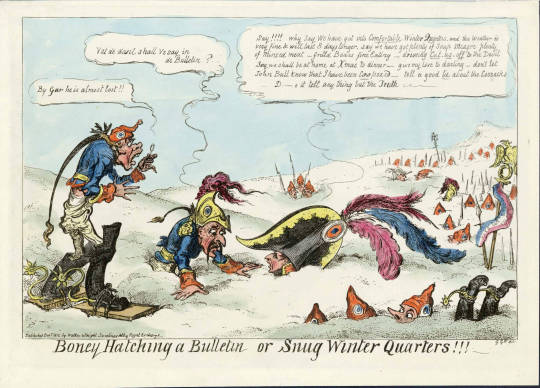
“Boney Hatching a Bulletin or Snug Winter Quarters!!!”
University of Washington‘s Napoleonic Period Collection of Caricatures
2 notes
·
View notes
Text
We took up our residence in the rancho, or hovel, of a curious old Spaniard, who had served with Napoleon in the expedition against Russia.
"Journal of Researches into the Natural History and Geology of the Countries Visited During the Voyage of H.M.S. Beagle Round the World, 1832-36" - Charles Darwin
#book quote#the voyage of the beagle#charles darwin#nonfiction#residence#hospitality#rancho#hovel#spaniard#napoleon#russia#french invasion of russia#russian campaign#second polish war#army of twenty nations#patriotic war of 1812
0 notes
Text
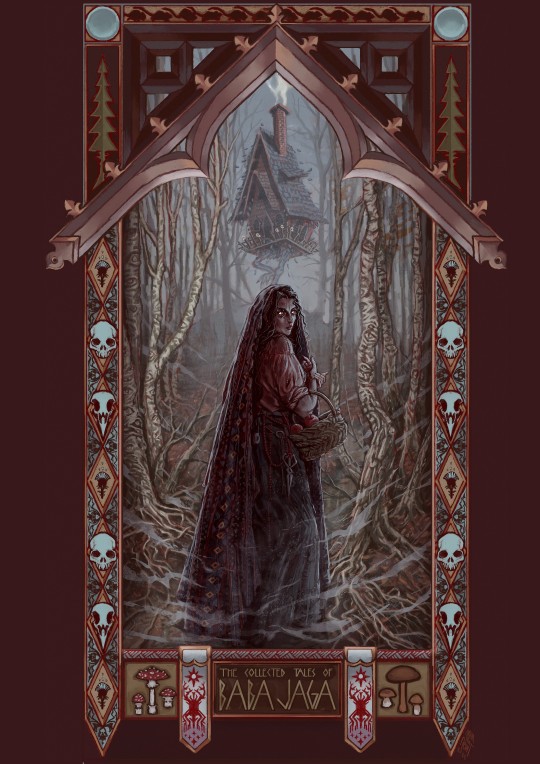
Laudna, Witch of the Woods
Here is a crispy autumnal piece I just had to paint when I thought of the paralells between Laudna and certain Slavic folklore elements.
#laudna#cr laudna#critical role#critical role fanart#critrole#bells hells#critical role campaign 3#bilibin#folklore#baba yaga#baba jaga#slavic folklore#russian folklore#slavic mythology#artists on tumblr#folklore art
5K notes
·
View notes
Text

Albrecht Adam (or "le petit peintre", as Eugène referred to him) was the pastry baker turned battle painter who had followed Eugène's 4th corps onto the Russian campaign. He later, in 1827, published a book with drawings from this journey, entitled "Voyage pittoresque et militaire de Willenberg en Prusse jusqu'à Moscou" (to be found in Wikimedia Commons).
The drawing above unfortunately had remained a sketch. It shows, according to the title, a moment of "repose during the day of 28 July", with cavalry on the march in the background, and a couple of people resting in the shadow of some wooden chapel.
A closer look (and the text of Adam's travel journal) reveals who the two main figures are:

That hat is clearly recognisable 😋. His Majesty King Joachim of Naples in person. And the other guy, the plain, boring one, would of course be Eugène.
Note: In July 1812 they were still on speaking terms. I believe Murat is even behaving very generously here. Most likely, Eugène could only sit down in the presence of a monarch if said monarch explicitly allowed it.
#napoleon's marshals#napoleon's family#joachim murat#eugene de beauharnais#russian campaign#march to moscow#1812
24 notes
·
View notes
Text
eddie munson at the beginning of the school year: oh yeah im gonna corrupt these teens with d&d and rock & roll
Eddie munson by school break: ooOHH FUCK THE CHILDREN ARE CORRUPTING ME I REPEAT THE CHILDREN ARE CORRUPTING ME
#nothing funnier than this guy who’s like 20 cause he got held back 2 years#thinking he’s super metal and gonna turn these kids into rebels#only for them to turn up months later in the middle of a crisis#absolutely chill as fuck#with like 2 of the most popular prissy students in high school#and all of them are like ‘yeah we regularly fight monsters and the government get a grip’#Eddie just realising that all the stuff he put in his campaigns is nothing compared to what these random kids he took under his wing#have done regularly#still waiting for someone to bring up the fact that Dustin electrocuted that Russian torture doc to death a while ago#eddie munson#stranger things#hellfire club#stranger things 4#dustin henderson#Mike wheeler#lucas sinclair#max mayfield#bee talks
10K notes
·
View notes
Text

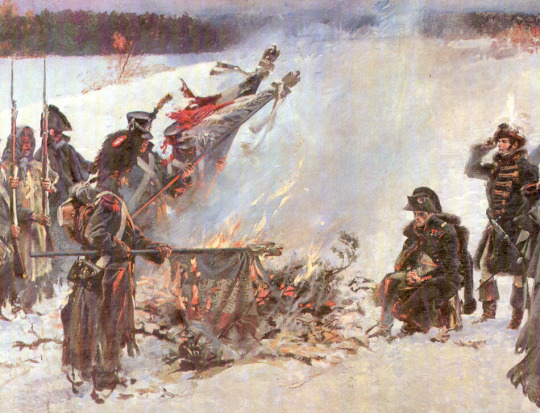
Burning of Regimental Flags before Napoleon by Wojciech Kossak
Burning of Standards in 1812, fragment of 'The Berezina Panorama'
#napoleon#bonaparte#napoléon bonaparte#russian campaign#russia#france#french#la grande armée#art#wojciech kossak#history#napoleonic wars#napoleonic#retreat#europe#european#snow#winter#flags#napoleon bonaparte#napoléon#emperor#empire
184 notes
·
View notes
Text
Over half of anti-Heard tweets were bots or paid trolls, many linked to Saudi government bots.
"According to an investigation by Tortoise Media, which examined more than one million tweets, more than 50 per cent of anti-Heard messages in the run-up to the 2022 defamation case were "inauthentic' - either from automated "bot" accounts or people hired to attack the actress."
"Bradley Hope, author of a book on Bin Salman, told the podcast that the pro-Depp tweets emanating from Saudi Arabia appear to be produced by "flies", a name for Saudi bot accounts."
"An intelligence professional who tracks online disinformation campaigns, said there was only a "0.1 per cent chance" that the hate directed at Heard was from genuine Depp fans.
The investigation also claims that bot networks in Thailand and Spain tweeted large numbers of pro-Depp messages."
"...more than 100 Twitter accounts sent 1,000 identical messages at exactly the same time to any company that had worked with Heard, reading: "This brand supports domestic violence against men."'
"The makers of the podcast argue that the criticism of Heard could have affected the jury in the 2022 US defamation trial which found in favour of Depp."
"So, if you couldn't tell the difference between a real-life Johnny Depp fan and a bot in 2022, then you probably won't be able to tell a Russian troll from a US election official in 2024. And that represents a serious problem for the security of our democracies."-Alexi Mostrous, presenter of the podcast.
"Johnny Depp and the Saudi Embassy did not respond to Tortoise's request for comment."
#Amber Heard#Depp v Heard#Johnny Depp#Johnny Depp Is A Wife-Beater#Johnny Depp Is A Rapist#Tortoise Media#Who Trolled Amber?#Mohammed bin Salman#Prince Bone Saw#Propaganda#Misinformation#Bots#Foreign Influence Campaign#Indict Johnny Depp#Indict Adam Waldman#Disbar Adam Waldman#Johnny Depp Is A Saudi Asset#Probably A Russian One Too#I Stand With Amber Heard
151 notes
·
View notes
Photo




Cᴀᴘᴛᴀɪɴ Jᴏʜɴ Pʀɪᴄᴇ ɪɴ Cᴀʟʟ ᴏғ Dᴜᴛʏ: Mᴏᴅᴇʀɴ Wᴀʀғᴀʀᴇ II [2022]
#this man and the original trilogy started my obsession with special forces and military#a decade ago!#the campaign slaps oh it does#also the Big Bad Russian callback in the very end oh my oh my#another 3 years of waiting probably fck me#so much nostalgia#the man the myth the legend#captain price#cod#call of duty#modern warfare#cod mw#cod mw 2
2K notes
·
View notes